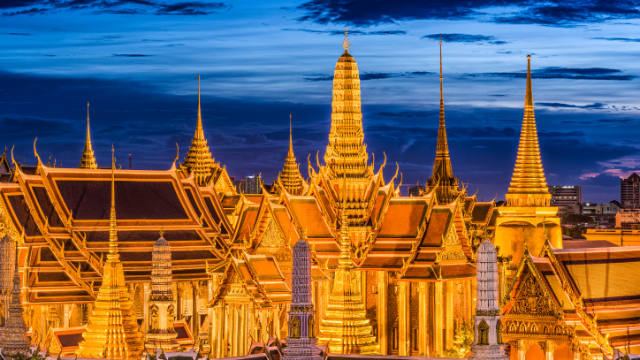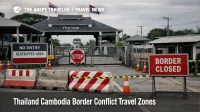Thailand
Imagine a place where the vibrant energy of bustling cities meets the serene whispers of untouched beaches—welcome to Thailand. As you travel through the Land of Smiles, the rich tapestry of its culture unfolds like a delicate Thai silk, woven with bright, intoxicating hues. The aroma of vibrant street foods like pad thai and spicy tom yum soup mingles with the refreshing scent of lemongrass, inviting you to savor every bite on your journey. The golden spires of temples glisten under the tropical sun, each one echoing with the deep, resonant chants of monks in prayer. In this captivating country, the lush emerald jungles conceal hidden wonders, and bustling markets overflow with colorful silks, handcrafted jewelry, and the distant chatter of locals and wanderers alike. Traveling to Thailand promises an adventure where every moment is a postcard-worthy encounter, beckoning you to explore its depths with the marvel and delight of a true adventurer.
Thailand Travel Season
Thailand is a remarkable destination with its lush landscapes, vibrant culture, and delicious cuisine, attracting travelers year-round. When planning travel to Thailand, understanding the various seasons can greatly enhance your experience. The weather, events, and crowd levels differ significantly depending on when you visit, making it crucial to choose the right time for your trip.
Peak Tourist Season
For those planning travel to Thailand, the peak season typically spans from November to early March. This period is considered the best time to visit Thailand due to its dry and cooler weather conditions. Travelers can enjoy comfortable temperatures ideal for exploring Thailand’s renowned beaches, temples, and cities. As this is a popular season, expect bustling tourist areas, fully booked accommodations, and a lively atmosphere. Major destinations like Bangkok, Phuket, and Chiang Mai will be at their busiest.
Ideal Times to Visit
For those yearning to enjoy favorable weather without the overwhelming tourist masses, the shoulder seasons, such as late March to early May and September to early November, are ideal. During these times, travel to Thailand means benefiting from moderately lower temperatures and manageable humidity levels, making it perfect for exploration. Travelers can experience fewer crowds and often find better deals on flights and hotels. It's a fantastic opportunity to enjoy the blend of calmness and the warmth of local hospitality.
A Unique Experience
Those who choose to travel to Thailand during the off-peak season, particularly from May to October, will encounter the rainy season. Although the monsoon might deter some, this period offers its own charm with vibrant green landscapes and softer lighting for photography. Rain showers are generally brief and sporadic, allowing travelers to continue their activities. This season is ideal for those interested in eco-tourism or cultural tours, and it offers a unique perspective of Thailand’s natural beauty.
Seasonal Festivities
Each season in Thailand comes with its unique festive mood. Visiting during the peak season grants travelers the chance to experience festivals like the iconic Loi Krathong, known for illuminating Thailand with floating lanterns. Similarly, the shoulder season offers Songkran, the traditional Thai New Year festival, marking April with exhilarating water fights and lively celebrations. Immersing yourself in these local events can provide a deeper understanding of Thailand’s culture and traditions.
Whether deciding to travel to Thailand during the bustling peak season or opting for the tranquility of the less crowded periods, travelers can anticipate an array of experiences. Thailand’s dynamic seasons ensure that there is always something special to behold, making the country a traveler's paradise at any time of the year.
The Weather and Seasons in Thailand
Travel to Thailand offers a fantastically varied climate that varies significantly throughout the year, providing travelers with a diverse range of experiences. Nestled in Southeast Asia, Thailand enjoys a tropical climate defined by three primary seasons: the hot season, the rainy season, and the cool season. Each season presents unique travel opportunities, weather conditions, and cultural events, making Thailand a year-round destination.
Hot Season in Thailand
The hot season in Thailand typically runs from March to June. During this period, travelers can expect average temperatures ranging from 95°F to 104°F (35°C to 40°C). While the blazing sun and high temperatures might seem daunting, travel enthusiasts are drawn to Thailand's beaches, such as those in Phuket and Koh Samui, offering idyllic settings for sunbathing and water sports. Although it’s the hottest time of the year, travel to Thailand around this period coincides with Songkran, the traditional Thai New Year in April, which is celebrated with water festivals across the country.
Rainy Season in Thailand
The rainy season, also referred to as the monsoon season, typically spans from July to October. During these months, Thailand experiences its highest rainfall, making it a lush, green paradise. Temperatures are a bit more forgiving, generally hovering between 77°F to 90°F (25°C to 32°C). While the rain is often heavy, it is usually not continuous, with frequent breaks of sunshine. For the adventurous traveler, this is a great time to explore Thailand’s northern regions like Chiang Mai, where the landscape is vibrant and waterfalls are in full flow. Despite the rain, travel to Thailand during this season remains popular, and budget-conscious travelers may find plenty of accommodation deals.
Cool Season in Thailand
The cool season, from November to February, is the most favored time for travel to Thailand. During this period, temperatures range from 64°F to 86°F (18°C to 30°C), offering a pleasant escape from colder climates. The weather is dry with sunny skies, making it an ideal time for exploring historical sites, bustling Bangkok, and the rich cultural heritage of Thailand's ancient cities like Ayutthaya. The cool season is marked by an influx of travelers, given its favorable weather and coinciding with many festivals, such as the picturesque Loy Krathong festival, which fills the night sky with floating lanterns.
Travel to Thailand offers an array of weather conditions that cater to every type of traveler. Whether it's the sunny beaches during the hot season, the vibrant emerald landscapes during the rainy season, or the mild, dry climate of the cool season, Thailand is a destination that promises unique experiences year-round. Travel enthusiasts can enjoy Thailand's rich cultural tapestry, colorful festivals, and diverse climate, creating memories that will last a lifetime.
Accepted Payment Methods and Other Payment Information in Thailand
When planning your travel to Thailand, understanding the country’s payment options can enhance your overall experience. The local currency is the Thai Baht (THB), which is widely used throughout the nation. Coins come in denominations of 1, 2, 5, and 10 Baht, while notes ranging from 20 to 1,000 Baht are available. Currency exchange services are abundant, with banks, currency exchange booths, and airports offering competitive rates to travelers visiting Thailand.
In Thailand, credit card usage is popular, especially in urban areas such as Bangkok, Chiang Mai, and Phuket. Major credit cards including Visa and Mastercard are widely accepted in hotels, restaurants, and shopping centers. American Express is accepted in select locations, particularly upscale venues, but Discover is less commonly used. Travelers might find limitations on the acceptance of credit cards in smaller towns and rural areas, where cash remains king.
While credit cards provide convenience when you travel to Thailand, cash usage is still prevalent and often preferred by smaller businesses, markets, and street vendors. ATMs are readily available throughout Thailand, offering an easy way to withdraw local currency. However, it’s advisable to inform your bank about your travel to Thailand to avoid any disruptions in using your cards. Be aware that there are often ATM fees and some banks may impose international transaction fees.
Tipping Etiquette
In Thailand, tipping is not mandatory, but it is appreciated for good service. In restaurants, consider rounding up the bill or leaving a 10% tip if the service charge is not included. For bellhops and housekeeping in hotels, a small tip of 20-50 Baht is a courteous gesture. Taxi drivers do not expect tips but rounding up to the nearest 10 Baht is a common practice. Tipping should reflect your satisfaction with the service and is always at the discretion of the traveler.
When you travel to Thailand, it's beneficial to download payment apps such as PromptPay for peer-to-peer transfers, facilitating smooth transactions without requiring cash or cards. Be mindful of payment fraud, keeping your card details secure and using trusted networks for online payments. Armed with this information, your travel to Thailand can be a smooth experience, allowing you to focus on enjoying the country’s rich culture and breathtaking landscapes.
Why You Should Travel to Thailand
Travel to Thailand promises an unforgettable adventure, offering a diverse array of experiences that captivate travelers from around the world. From vibrant cities to serene landscapes, Thailand is a destination where cultural richness and stunning natural beauty go hand in hand.
Enchanting Temples and Spiritual Heritage
Thailand is renowned for its awe-inspiring temples. A visit to the Grand Palace and Wat Phra Kaew in Bangkok reveals the intricate artistry and sacred traditions embedded in Thai culture. Travelers are mesmerized by the serene atmosphere and intricate architecture of Wat Pho, home to the famous reclining Buddha. These temples serve as a window into Thailand's spiritual heritage and display the nation's deep-rooted devotion to Buddhism.
Breathtaking Beaches and Islands
The country boasts some of the world's most incredible beaches. Travelers to Thailand will discover pristine white sands and crystal-clear waters on islands like Phuket, Koh Samui, and Koh Phi Phi. These idyllic locations provide ample opportunities for relaxation, water sports, and unparalleled marine exploration through snorkeling and diving. The beauty of Thailand's coastal areas is a magnet for sun-seekers and adventurers alike.
Exquisite Thai Cuisine
Thailand is synonymous with culinary delight. Streets are lined with vendors offering an array of flavors, from spicy curries to fragrant noodles. With dishes like Pad Thai, Tom Yum Goong, and Green Curry, Thailand offers a culinary journey that delights and challenges the palate. Travelers can immerse themselves in local food markets or take cooking classes to learn the secrets behind these iconic dishes.
Vibrant Night Markets and Shopping
The allure of Thailand’s vibrant night markets is irresistible. Places like Chiang Mai's Night Bazaar and Bangkok's Chatuchak Weekend Market immerse travelers in a world of artisanal crafts, unique souvenirs, tantalizing street food, and eclectic apparel. These markets are a cultural experience and a shopping paradise, offering something for every taste.
Rich Cultural Festivals
Travelers can experience the colorful festivities of Thailand's many cultural celebrations. Loy Krathong, the Festival of Lights, and Songkran, the Thai New Year, present spectacular displays of tradition, unity, and spirituality. These festivals allow visitors to participate in local customs and witness the warmth and friendliness that characterize Thai society.
Lush National Parks and Wildlife
Travelers are drawn to Thailand's natural beauty, with its numerous national parks offering diverse landscapes and wildlife. From the limestone cliffs and emerald waters of Khao Sok National Park to the majestic waterfalls of Erawan National Park, nature enthusiasts are provided opportunities for hiking, bird-watching, and exploring the country's rich flora and fauna.
Traditional Thai Massage and Wellness
Thailand is a haven for relaxation and rejuvenation. The traditional Thai massage is a world-renowned therapeutic practice that many travelers seek for its health benefits. Numerous wellness retreats and spas offer a tranquil escape, combining ancient techniques with luxurious treatments to heal both body and mind.
Historical Treasures and Ancient Ruins
For those intrigued by history, Thailand is home to ancient ruins and UNESCO World Heritage Sites like Ayutthaya and Sukhothai. These historical parks offer glimpses into the former glory of Thailand’s ancient capitals, with stunning architecture and sculptures that narrate the stories of past centuries.
Thriving Nightlife and Entertainment
Thailand's nightlife is as diverse as its landscapes, ranging from the bustling clubs of Bangkok to the laid-back beach bars of Koh Phangan. The Full Moon Party is a must-visit event for incorrigible party-goers, while cabaret shows and traditional Thai performances provide entertainment for those seeking a cultural experience.
Warm Hospitality and Friendly Locals
Lastly, travelers to Thailand often comment on the friendliness and hospitality of its people. Known as the "Land of Smiles," Thailand offers an inviting atmosphere where visitors feel welcomed and valued. The genuine kindness and warmth of the Thai people enhance the travel experience, ensuring that those who visit feel like a part of the community.
The History of Thailand
Thailand, an alluring gem in Southeast Asia, boasts a rich tapestry of history that has intricately shaped its current cultural identity. For those who travel to Thailand, the country's ancient history offers a fascinating journey back in time. Once known as Siam, Thailand has managed to preserve its independence through the colonial era, unlike many of its neighbors. The roots of Thai civilization can be traced back to the Thonburi and Rattanakosin kingdoms, where notable rulers like King Rama V implemented significant reforms, steering the nation toward modernization. This historical depth makes Thailand an enticing destination for those eager to delve into a nation that has successfully maintained its sovereignty and cultural uniqueness amidst the tides of change.
The spiritual and architectural wonders spread across the country further illustrate Thailand's storied past. The magnificent city of Ayutthaya, a UNESCO World Heritage Site, serves as a reminder of Thailand’s golden age in the 14th to 18th centuries. Visiting these historical ruins provides an immersive experience into the era when Ayutthaya was one of the world’s most prosperous cities. Meanwhile, Sukhothai, regarded as the birthplace of Thai civilization, offers mesmerizing ruins of temples and palaces that chart the early artistic and cultural progression of the country. These landmarks are not just remnants of old cities; they are testimonies to Thailand's enduring cultural and historical legacy.
Cultural heritage in Thailand is deeply embedded in its traditions and festivals which vividly display the country's rich past and vibrant present. A travel to Thailand would be incomplete without experiencing the grandiosity of festivals like Songkran, the Thai New Year, or Loi Krathong, where thousands of illuminated lanterns light up the night sky. These celebrations are testament to the fusion of ancient traditions with modern festivity, showcasing the nation's deep respect for its heritage amidst a rapidly evolving society. Artifacts and treasures preserved in the National Museum in Bangkok further enrich the understanding of Thailand's artistic and cultural evolution over centuries.
Modern Thailand has seamlessly blended its historical roots with contemporary growth, making it a compelling destination for both history aficionados and those seeking modern-day vibrance. Bangkok, the bustling capital, encapsulates this fusion with its thriving markets, old-world canals, and traditional shrines juxtaposed against a skyline punctuated with postmodern architecture. As one of the few countries in the region never to be colonized, Thailand today offers a unique insight into a culture that has maintained its autonomy while adapting to the pressures of globalization. Travelers captivated by history will find Thailand's ability to integrate its rich past with its dynamic present a truly enriching experience.
The Culture of Thailand
Thailand, known as the "Land of Smiles," offers a rich tapestry of culture and tradition that beckons travelers from around the globe. One of the most striking aspects of Thai culture is its deep-rooted traditions, many of which are intertwined with Buddhism. This religious influence is evident in daily life, from the ornate temples that dot the landscape to the way people greet each other with a respectful "wai," where the palms are pressed together in a prayer-like fashion. The practice of ‘making merit’ by offering food to monks each morning is another cherished tradition that allows travelers a unique glimpse into the spiritual life of Thailand.
The festivals in Thailand are vibrant celebrations that reflect the country's cultural diversity and offer an inviting atmosphere for travelers. The famous Songkran festival, marking the Thai New Year in April, transforms the streets into a lively water festival where people of all ages splash water on each other as a symbol of cleansing and renewal. Loy Krathong, another enchanting festival, involves floating beautifully crafted baskets down rivers and lakes as a way to pay respects to the water spirits. Visitors who travel to Thailand during these times are treated to an array of colors, lights, and sounds, making it an unforgettable experience.
Daily customs in Thailand emphasize the importance of family, respect, and community. Meals are often shared family-style, reflecting the communal spirit where many dishes are placed in the center of the table for everyone to enjoy. Thai cuisine itself is a delicious expression of the country's diverse cultural influences, blending sweet, sour, salty, and spicy flavors in a harmonious balance. The traditional Thai dance and music, such as the classical 'khon' masked dance or the soothing melodies of 'piphat' ensembles, encapsulate the grace and elegance that are hallmarks of Thai cultural expressions. Travelers visiting Thailand will discover that these art forms are not simply performances, but cherished traditions passed down through generations.
Thailand's multiculturalism is a compelling aspect for travelers, as the country is home to numerous ethnic groups and influences, including the indigenous Hill Tribes like the Karen and Hmong, who contribute to the country’s rich cultural mosaic. These communities often live in the northern regions and are known for their distinctive clothing, languages, and customs. Efforts to preserve their unique cultural identities while promoting sustainable tourism have been increasingly successful, offering travelers an opportunity to experience authentic and respectful cultural exchanges. The blend of indigenous traditions with Thai culture creates a uniquely rich and diverse cultural experience that draws travelers to explore and appreciate the deep-rooted and colorful heritage of Thailand.
The Culinary Experience of Thailand
Traveling to Thailand offers an extraordinary culinary journey that tantalizes the taste buds with a vibrant array of flavors and aromas. Thailand is renowned for its unique blend of sour, sweet, salty, bitter, and spicy flavors, which are artfully combined to create dishes that are both complex and satisfying. Travelers can indulge in a variety of culinary experiences, from enjoying the exquisite street food to savoring dishes in high-end restaurants. A visit to Thailand is incomplete without trying the quintessential Thai cuisine, which includes dishes like Pad Thai, Tom Yum Goong, and Green Curry, among others. Each dish reflects the rich cultural heritage and traditions of Thailand, making each meal a memorable experience.
Street food is a defining feature of the culinary scene in Thailand, offering an immersive and accessible way to experience local cuisine. Wandering through the bustling night markets in Bangkok, Chiang Mai, or Phuket is a feast for the senses, with stalls offering a plethora of choices such as grilled skewers, crispy spring rolls, and hearty bowls of noodles. The popular floating markets also provide a unique dining experience, where vendors serve delicious local fare directly from their boats. Alternatively, for those seeking a more refined dining experience, Thailand boasts a growing number of fine-dining establishments that offer innovative Thai dishes utilizing traditional flavors with contemporary techniques.
Authentic Beverages of Thailand
While exploring the culinary delights in Thailand, travelers can also indulge in the country's distinctive beverages. Thailand's tropical climate makes it an ideal location for producing a variety of exotic fruits, which are transformed into refreshing juices and smoothies, perfect for quenching one's thirst after a day of exploring the local attractions. For those interested in alcoholic options, local beers like Singha and Chang are popular choices and are widely available in restaurants and bars. Moreover, Thailand's burgeoning wine industry is gaining international recognition, with local vineyards producing unique wines that reflect the country’s terroir. Additionally, Thai whiskey such as Sangsom can be found in many bars and is a must-try for visitors looking to sample local spirits.
Reflecting Culture and Catering to Diverse Diets
The culinary traditions in Thailand are deeply intertwined with its culture and customs, reflecting the influences of neighboring countries and historical trading partners that have contributed to shaping Thai cuisine. Many dishes incorporate ingredients like lemongrass, basil, galangal, and fish sauce, all of which are staples in Thai cooking. Seasonal dishes and food festivals also play a significant role in Thailand’s gastronomy; for instance, the Vegetarian Festival held annually in Phuket and Bangkok draws visitors from all over the world to sample vegan and vegetarian delicacies prepared with intricate care. Thailand's cuisine is inclusive, and travelers who have specific dietary needs will find an array of options. Many restaurants offer vegetarian and vegan versions of traditional dishes, and gluten-free options are becoming more readily available to cater to the diverse dietary preferences of global travelers.
What to See and Do in Thailand
Thailand, a mesmerizing blend of vibrant cultures, rich history, and breathtaking landscapes, is a top destination for every travel enthusiast. Whether you are a family looking for adventure, a solo traveler seeking solitude, or an explorer keen on cultural experiences, Thailand has something to offer. Delve into its wonders as you travel to Thailand and discover why this country captivates the hearts of so many.
The Majestic Wat Pho
When you travel to Thailand, a visit to Wat Pho is a must. This iconic temple in Bangkok is famed for its stunning Reclining Buddha statue, which stretches an impressive 46 meters. Beyond the statue, the temple complex is home to intricate murals, meditation gardens, and one of the oldest Thai massage schools. This destination offers families and solo travelers alike a serene space to appreciate Thai artistry and spirituality at its finest.
Adventuring in Chiang Mai’s Elephant Nature Park
For animal lovers traveling to Thailand, Chiang Mai's Elephant Nature Park provides an ethical sanctuary for elephants that have been rescued from various forms of abuse. Visiting here, you can learn about the importance of ethical animal treatment, feed the elephants, and observe them in a natural habitat. Ideal for families and solo adventurers, this heartwarming experience emphasizes Thailand’s commitment to wildlife conservation.
The Bustling Streets of Bangkok’s Khao San Road
Travel to Thailand is incomplete without experiencing the vibrant nightlife of Khao San Road. Known as a backpacker hub, this Bangkok street is filled with a lively mix of street food stalls, quirky bars, and market stalls selling everything from clothes to souvenirs. It is a haven for solo travelers and those seeking an energetic, multicultural atmosphere filled with new friends and exciting adventures.
Sunrise at Angkor Wat
While technically in Cambodia, proximity invites travelers in Thailand to a short journey to witness the magnificent sunrise at Angkor Wat. This UNESCO World Heritage Site is an architectural marvel that stands as a testament to Khmer ingenuity. Perfect for solo travelers and families, waking up early to watch the light break over this ancient city offers an unforgettable experience intertwined with regional history.
Sailing Around the Phi Phi Islands
To embrace the sun-kissed beaches and crystal-clear waters, a day trip sailing around the Phi Phi Islands near Phuket is essential. Famous for their dramatic cliffs and vibrant marine life, the islands offer snorkeling, swimming, and simply relaxing on sandy beaches. Adventure seekers will love the thrill of exploring hidden lagoons and snorkeling in aqua-blue waters filled with colorful marine creatures.
Delight in Thai Cuisine with a Cooking Class
For food enthusiasts, travel to Thailand presents an opportunity to dive into the world of Thai flavors through a local cooking class. Learn to whip up traditional dishes like Pad Thai, Green Curry, and Tom Yum Soup from experienced local chefs. This hands-on experience is perfect for families and food lovers, allowing them to take back a piece of Thailand’s culinary heritage.
Wander through the Ruins of Ayutthaya Historical Park
Explore the sweeping ancient ruins of Ayutthaya, a UNESCO World Heritage Site that was once the capital of the Kingdom of Siam. Families and history buffs will be captivated by the temple ruins and the preserved structures demonstrating splendid Thai architecture. Travel to this historical park unveils stories of past dynasties and offers a peaceful contrast to bustling city life.
Cultural Immersion in a Thai Traditional Dance Performance
Immerse yourself in the cultural richness of Thailand by attending a traditional dance performance. These captivating shows, often accompanied by classical music, tell stories through elegant movements and colorful costumes. Perfect for cultural travelers and families, these performances offer insight into Thailand's cultural traditions and artistic expression.
Floating Market Experience
A visit to one of Thailand’s floating markets is a vibrant glimpse into local life. Damnoen Saduak, near Bangkok, is perhaps the most famous, teeming with vendors selling everything from fresh fruits to handicrafts from their boats. Families can enjoy this unique shopping adventure and savor the authentic flavors of Thai street food on the water.
Venture into the Jungle with a Trek in Khao Sok National Park
Nestled in the south of Thailand, Khao Sok National Park offers adventure seekers a chance to explore one of the world's oldest rainforests. Trekking routes lead through lush greenery and alongside limestone karsts, ideal for solo travelers or families looking for an unforgettable connection with nature. Encounter wildlife, glide down serene rivers, and absorb the pristine beauty of Thailand’s natural landscapes.
Tips & Tricks for Traveling in Thailand
Understanding Local Etiquette
One of the most essential pieces of advice when you travel to Thailand is to familiarize yourself with local customs and etiquette. A significant aspect of Thai culture is respect for the monarchy. You should avoid making negative remarks about the royal family as it is considered a serious offense. Also, when visiting temples, dress modestly; shoulders and knees should be covered to show respect. Removing your shoes before entering homes and temples is standard practice in Thailand. Additionally, always use your right hand when giving or receiving items. Greetings are commonly done with a “wai,” a gesture that involves placing your palms together in a prayer-like fashion and bowing slightly.
Navigating Local Transportation
Thailand offers a variety of transportation options catering to all budgets. For short distances, tuk-tuks are an iconic and fun way to get around. Negotiate fares beforehand to avoid being overcharged. Motorbike taxis are perfect for a quick ride in congested areas, but remember safety first—always wear a helmet. For longer distances, consider using the BTS Skytrain in Bangkok; it’s clean, efficient, and budget-friendly. Trains and buses between cities are also reliable and economical options. If you're venturing to remote areas, renting a scooter is popular but ensure that you carry proper documentation, including an international driver’s permit.
Budgeting Smartly
Travel to Thailand can be very affordable if you plan your budget wisely. Street food is both delicious and inexpensive, allowing you to enjoy authentic Thai cuisine without breaking the bank. Opt for local Thai restaurants instead of touristy areas to save money. When shopping at local markets, practice haggling to get the best prices. Accommodation also ranges widely in price. Hostels and guesthouses are great for budget-conscious travelers. For those seeking luxury, high-end hotels offer excellent amenities at a fraction of the cost compared to Western standards.
Timing Your Travel
Understanding the climate is crucial to optimizing your travel to Thailand. The peak tourist season is from November to February when the weather is cooler and drier. Expect higher prices and larger crowds during this period. If you prefer fewer tourists, consider traveling during the shoulder season, March to May, and take advantage of lower accommodation rates. The rainy season from June to October might deter some travelers, but it’s a time when the country is lush and there are fewer tourists, providing a more intimate exploration experience.
Exploring off the Beaten Path
While popular destinations like Bangkok, Chiang Mai, and Phuket are renowned, Thailand offers exceptional hidden gems. Explore areas such as Pai in northern Thailand for its serene surroundings and vibrant arts scene. Head to lesser-known islands like Koh Lanta for pristine beaches without the crowds. For hiking enthusiasts, the Umphang Wildlife Sanctuary offers stunning landscapes and the impressive Thi Lo Su Waterfall. Embracing these less-trodden paths not only enriches your adventure but also supports local communities away from the tourist hubs.
Respecting Nature and Wildlife
While travel to Thailand often includes encounters with its rich biodiversity, it's vital to engage in sustainable and ethical tourism practices. Avoid attractions that exploit animals, such as elephant riding tours. Instead, visit sanctuaries where animals are rehabilitated and cared for. Volunteer excursions, such as helping with conservation efforts, offer meaningful ways to engage with local wildlife. When snorkeling or diving, do not touch or disturb marine life and be cautious of coral reefs. Practicing eco-friendly habits helps preserve Thailand’s natural beauty.
Connecting with Locals
Developing connections with locals can profoundly enhance your travel experience in Thailand. Learning a few basic Thai phrases goes a long way and is greatly appreciated. Phrases like "sawasdee" (hello) and "khop khun" (thank you) demonstrate respect. Participate in local activities such as cooking schools or cultural festivals to interact and learn from residents. Thai people are generally known for their warmth and hospitality, and making local contacts can lead to unexpected adventures and a deeper understanding of the country.
Using Technology Wisely
Leverage technology to make your travel in Thailand more efficient. There are numerous apps available to enhance your journey—the "Grab" app is a popular ride-hailing service that is often cheaper than traditional taxis. "Google Translate" can bridge language barriers, especially in rural areas. For foodies, "HappyCow" helps locate vegetarian and vegan dining options across the country. Additionally, always ensure your mobile device is secured with a local SIM card for internet access; this is both convenient and cost-effective for communication needs.
Photographers’ Paradise
For photography enthusiasts, Thailand is a dream location with its vibrant landscapes and dynamic city scenes. Early mornings and late afternoons offer the best lighting conditions for photography while capturing the essence of daily life. Visit the Damnoen Saduak Floating Market in the early morning to avoid crowds and capture stunning reflections on the water. The golden hues at sunset create magical imagery at temples like Wat Arun in Bangkok. Always ask for permission before taking portraits of locals to respect privacy and cultural considerations.
Enjoying Street Food Safely
Street food is an integral part of travel to Thailand and offers an authentic culinary experience. To ensure it’s safe, observe where locals are lining up—that’s usually a sign of freshness and quality. Peering into the preparation areas can also provide a sense of cleanliness. Start with cooked foods if your stomach isn’t accustomed to local cuisines. Options like pad thai or satay skewers are generally safe bets. Bringing hand sanitizer and staying hydrated will also help prevent any unwanted health issues during your culinary adventures in Thailand.
What To Know Before You Go to Thailand
Travel to Thailand immerses visitors in a rich tapestry of culture, history, and natural beauty. Before embarking on a journey to this captivating country, it is crucial to be informed about several key aspects to ensure a smooth and enjoyable experience.
Entry Requirements and Visas
When considering travel to Thailand, understanding entry requirements is essential. Many nationalities can enter Thailand without a visa for stays of up to 30 days under visa exemption agreements. However, for longer stays, obtaining a visa in advance is necessary. Travelers should check with the Thai embassy or consulate for the most current visa regulations, as they can change based on international relations or health precautions.
Health Precautions and Vaccinations
Travel to Thailand also requires awareness of health precautions. Vaccinations for hepatitis A and B, typhoid, and Japanese encephalitis are recommended. It is important to consult with a healthcare provider for personalized advice. Additionally, travelers should consider malaria prophylaxis, especially if visiting rural areas. Travel insurance covering medical emergencies and unexpected events is highly recommended.
Local Customs and Etiquette
Respecting local customs is fundamental when traveling to Thailand. Acknowledge the Thai greeting known as the "wai," which involves a slight bow and hands pressed together. It is considered impolite to touch someone’s head or point feet towards anyone, as these actions are deemed disrespectful. Dress modestly when visiting temples, ensuring shoulders and knees are covered.
Transportation Options
Thailand offers a variety of transport options catering to different travel needs. The country has an extensive network of trains and buses for long-distance travel. In cities, taxis, tuk-tuks, and motorcycle taxis are popular. For an adventurous travel experience, renting a motorbike is an option, but it requires caution and an international driving permit.
Tipping Culture
Understanding tipping culture is part of travel to Thailand. Generally, tipping is not obligatory, but appreciated. In restaurants, leaving small change or rounding up the bill is common. For exceptional service, a 10% tip is generous. Tipping hotel staff, tour guides, and taxi drivers is also customary, usually at the traveler’s discretion.
Common Phrases
While traveling to Thailand, learning a few common phrases can enhance interaction with locals. Basic phrases include "Sawasdee" for hello, "Khop khun" for thank you, and "Chai" for yes. Adding "ka" or "krub" at the end of a sentence indicates politeness, with "ka" used by females and "krub" by males.
Communication Tips
Non-native speakers should note that English is widely understood in tourist areas of Thailand, though not everywhere. Having a translation app or phrasebook can be helpful for effective communication. Additionally, speaking slowly and using simple words can bridge language barriers efficiently.
Travel to Thailand promises a captivating blend of experiences, from bustling cities to serene beaches. Being well-prepared with knowledge of entry requirements, health precautions, local customs, transportation, and language will ensure a memorable and seamless adventure. As travelers engage with the vibrant spirit of Thailand, they will undoubtedly find it an enchanting destination.
Accessibility in Thailand
Thailand, a vibrant and culturally rich travel destination, offers various levels of accessibility for travelers with different needs. When planning travel to Thailand, individuals using wheelchairs or with limited mobility may encounter challenges, but the country is continually making strides toward improving its accessibility infrastructure. Major cities like Bangkok and Chiang Mai have made concerted efforts to cater to diverse travelers through improved facilities and services.
Physical Accessibility for Travelers with Limited Mobility
Travel to Thailand can be somewhat challenging for those with limited mobility, yet there are notable improvements in key areas. In major urban centers, many hotels have started to improve their facilities with ramps, elevators, and accessible bathrooms. Large shopping malls and modern buildings in cities like Bangkok often feature excellent accessibility, with ramps and elevators aiding wheelchair users. However, outside of these metropolitan areas, the accessibility might be considerably less developed, with many older buildings lacking the necessary adaptations.
Accessible Public Transportation
Public transportation in Thailand has seen enhancements to accommodate diverse traveler needs. The Metropolitan Rapid Transit (MRT) and the Bangkok Mass Transit System (BTS) Skytrain have facilities for travelers with limited mobility, such as elevators, designated seating, and tactile paving for the visually impaired. However, buses often lack these facilities, making travel within Thailand more dependent on personal or tourist-arranged transportation options. Taxis and ride-hailing services can sometimes accommodate wheelchairs with prior notice, offering greater ease of travel to Thailand for those who require it.
Visual and Auditory Accommodations
While visual and auditory accommodations are still a developing aspect of Thailand’s accessibility landscape, progress is visible in certain areas. Some museums and cultural sites have started to introduce audio guides, braille information, and guided tours for the visually impaired. Tourist information centers in major cities are beginning to offer services tailored for both visually and hearing-impaired travelers, although these services may not yet be widely available throughout the country.
Accessible Tourist Attractions
Thailand is home to a number of tourist attractions that strive to be accessible to all visitors. Prominent sites such as the Grand Palace and Wat Pho in Bangkok have made efforts to accommodate travelers with disabilities, offering ramps and smooth pathways. While not all historical sites have reached this level of accessibility, an increasing number of businesses and attractions are recognizing the importance of inclusivity in travel to Thailand. Additionally, various travel agencies specialize in tours for travelers with disabilities, offering customized itineraries that ensure accessible experiences across the country.
Overall, Thailand is on a journey towards becoming more accessible, with significant improvements in urban areas. While travel to rural areas might still pose challenges, ongoing developments in infrastructure and public awareness continue to make travel to Thailand an increasingly inclusive experience. Travelers are encouraged to plan ahead and communicate specific needs to ensure the most seamless and enjoyable travel experience possible.
Health & Safety in Thailand
Traveling to Thailand is a rewarding experience, offering lush landscapes, vibrant cities, and rich cultural heritage. However, travelers should be aware of several safety concerns during their stay.
Water Safety
Water safety is a key concern when traveling to Thailand. While exploring the beautiful beaches and islands, it is important to be cautious of strong currents and riptides, particularly during monsoon season from May to October. Travelers should adhere to local warnings and avoid swimming in areas without lifeguards. Drinking water from taps is generally not advised in Thailand, so it is recommended to consume bottled or purified water to avoid health risks.
Natural Disaster Risks
Thailand is susceptible to natural disasters including floods, earthquakes, and tsunamis, particularly in coastal regions. Travelers should stay informed about weather forecasts and any warnings issued by local authorities or the Thai Meteorological Department. During the rainy season, which lasts from June to October, flooding can occur, causing disruptions to travel and transport. It is advisable to have an emergency plan and stay in contact with your country's embassy or consulate in case of a natural disaster.
Crime
Petty crime, such as pickpocketing and theft, is a concern for those traveling to Thailand, especially in crowded tourist areas like markets, beaches, and public transport. To minimize risks, keep your belongings secure, remain vigilant, and be cautious when approached by strangers. Scams targeting tourists, such as fraudulent gem sales or taxi overcharging, are also common, so being informed and skeptical can help avoid these traps.
Political and Social Unrest
Thailand occasionally experiences political demonstrations and social unrest, which can sometimes result in violence. Travelers should avoid large gatherings and protest areas, particularly in cities like Bangkok, to ensure safety. Staying updated with local news and adhering to travel advisories from official sources can help you avoid potential trouble spots.
Health and Safety Precautions
Healthcare facilities in Thailand's major cities, such as Bangkok and Chiang Mai, are generally of a high standard, but access may be limited in more remote areas. Travel to Thailand does not require specific vaccinations, yet it is advisable to be up-to-date with routine vaccinations and consider additional ones, like those for hepatitis A and B or typhoid, depending on your itinerary. Travelers should also safeguard against mosquito-borne diseases like dengue fever by using insect repellents and nets.
Being aware of these safety concerns and taking necessary precautions can help ensure a safe and enjoyable travel experience in Thailand.
Other Places You Might Like
Bali, Indonesia - Bali, much like Thailand, is renowned for its stunning beaches, cultural richness, and vibrant nightlife. Travelers who enjoyed the bustling streets of Bangkok or the serene beaches of Phuket will find Bali's Kuta and Ubud neighborhoods captivating. The island's lush landscapes, cultural temples, and beautiful terraced rice paddies echo the diverse offerings of Thailand. The warm hospitality of the Balinese people and their rich traditions give travelers a sense of familiarity reminiscent of Thailand's welcoming atmosphere.
Luang Prabang, Laos - This charming city offers a serene alternative to the bustling cities of Thailand, appealing to those who enjoyed the cultural aspects and quaint towns like Chiang Mai. Nestled at the confluence of the Nam Khan and Mekong Rivers, Luang Prabang is a UNESCO World Heritage Site renowned for its well-preserved architecture and vibrant night markets. Visitors can enjoy quiet strolls through the city’s vibrant streets, explore intricately designed temples, and experience traditional Laotian culture in an environment similar to Thailand’s cultural towns.
Siem Reap, Cambodia - If the ancient temples of Thailand, such as Ayutthaya or Sukhothai, were a highlight, then Siem Reap will be a perfect destination with its close proximity to the Angkor Wat complex. This destination allows travelers to dive deeper into Southeast Asia's rich architectural history and cultural heritage. The lively night markets and street food culture will remind travelers of the bustling energy found in Thailand's vibrant cities.
Hoi An, Vietnam - Located along Vietnam’s central coast, Hoi An offers a fusion of cultural influences that mirror the diversity found in Thailand. Known for its well-preserved Ancient Town, visitors can enjoy exploring its narrow alleys filled with beautiful yellow buildings, lantern-lit streets, and alluring riverside walks. Like Thailand, Hoi An provides a remarkable blend of natural beauty and cultural appeal, resonating with travelers who appreciate historical architecture and cultural festivities.
Goa, India - As a coastal region boasting captivating beaches and dynamic nightlife, Goa can enchant those who were captivated by Thailand’s coastal escapes. From the vibrant parties at night to the peaceful retreats during the day, Goa offers a mix of relaxation and entertainment similar to what travelers find irresistible in Thai beach destinations. Furthermore, the local cuisine, rich in spices and flavors, caters to those who enjoyed the bold culinary experiences associated with Thailand.
Final Thoughts
Unveiling the Magic of Travel to Thailand
Imagine a place where golden temples shimmer under the sun, tropical beaches extend endlessly into azure waters, and vibrant cities pulse with life and energy. Travel to Thailand is a passage into a world where diverse cultures and traditions weave a rich tapestry of experiences. From the bustling streets of Bangkok, where street food stalls offer aromatic delicacies, to the lush, quiet landscapes of Chiang Mai's mountains, Thailand promises an array of captivating adventures.
Embarking on a travel to Thailand unveils not just the stunning natural beauty of places like Phuket and the historic charm of Ayutthaya, but also the warmth and hospitality of its people. Whether you're exploring ancient ruins, partaking in a traditional cooking class, or relaxing with a Thai massage, the country's unique allure is irresistible and unforgettable. Thailand is not just a destination; it's a sensory experience that beckons travelers to discover its secrets.
As you ponder your next travel destination, consider the allure of Thailand. Its enchanting blend of vibrant culture, breathtaking landscapes, and profound spirituality makes it a must-visit for any adventurer. Whether you're a solo traveler, a couple looking for romance, or a family seeking fun, Thailand offers something special for every kind of explorer. Embark on a journey to this remarkable country, and let its wonders inspire your travel plans.
Bangkok, Thailand

Buri Ram, Thailand

Chanthaburi, Thailand

Chiang Mai, Thailand

Chumphon, Thailand

Hat Yai, Thailand

Ko Samui, Thailand

Koh Samui, Thailand

Krabi, Thailand

Laem Chabang, Thailand

Nakhon Si Thammarat, Thailand

Narathiwat, Thailand

Pattani, Thailand

Phang-Nga, Thailand

Phatthalung, Thailand

Phuket, Thailand

Phukey, Thailand

Sa Kaeo, Thailand

Satun, Thailand

Si Sa Ket, Thailand

Songkhla, Thailand

Surat Thani, Thailand

Surin, Thailand

Trang, Thailand

Trangm, Thailand

Trat, Thailand

Ubon Ratchathani, Thailand

Yala, Thailand

Cambodia Thailand Border Clash Cuts Angkor Tour Demand

Bangkok PM2.5 Forecast Worsens Jan 22 to 28

EF Go Ahead Food Tours Launch With America's Test Kitchen

Thailand Cambodia Border Conflict Travel Zones

Thailand Cambodia Border Clashes: 50 km Avoid Zone

Southern Thailand Floods Travel Update, Overstay Waiver

Thailand Cambodia Border Curfews Close Crossings

Southeast Asia Floods Reshape Travel Plans

Thailand Cambodia Border Clashes Tighten Travel Zones

Thailand Cambodia Border Fighting Triggers Travel Warning

Thailand Cambodia Border Clashes Disrupt Travel Plans

Sumatra And Thailand Floods Complicate Travel

Phuket Oceanfront Event Venue Opens December 2025

Asia Pacific Design Hotel Openings Through 2025

Asia Floods And Cyclones Disrupt December Travel

Typhoon Risk Alters Southeast Asia December Cruise Sailings

2028 World Cruise From Miami To Athens With Azamara

Cyclone Ditwah Floods Sri Lanka And Asia Travel Routes

Southern Thailand Floods Strain Rail And Border Travel

China Japan Flight Cuts Disrupt December Trips

South Asia Floods And Cyclone Ditwah Hit Winter Travel

Southeast Asia Floods Turn Winter Beach Trips High Risk

Southern Thailand Floods Disrupt Trains And Border Travel

Hat Yai Floods And Emergency Disrupt Travel

Hat Yai Floods Strand Tourists In Southern Thailand

